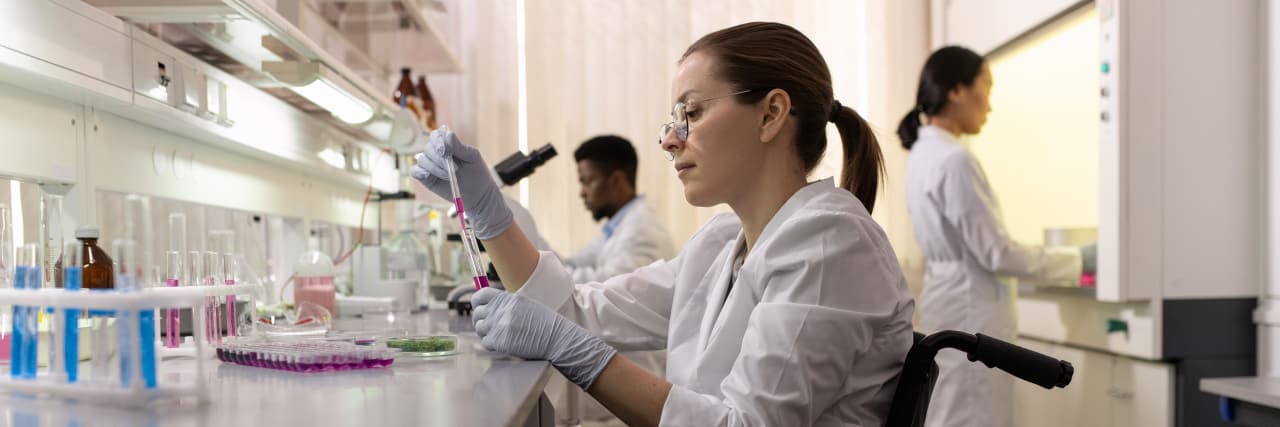Why We Must Fight for Disability Rights and Inclusion in STEM
One thing that I noticed when I started pursuing further education and a career in STEM (science, technology, engineering, and mathematics) was that I was part of a minority group. I was surrounded by mostly male individuals, though my cohort mates were more diverse in gender (most of the male individuals were older students and faculty). While this wasn’t surprising, it still was hard to digest. I’d always been encouraged to pursue science and surrounded by female friends in my STEM classes. I was expecting to be surrounded by new female scientists when I started in my new lab, so I was surprised when I started on the first day, I was one of two females.
Over time, when my lab mentor moved on to a new position, I became the only female in the lab. I didn’t think too much of it and kept to myself. I did have a few individuals to look to as role models in other labs in the department, so it didn’t strike me as out of the ordinary to be the only female in my lab. However, as I kept going forward in my training as a scientist, I could feel like I was different. My mental health suffered while finishing my undergraduate degree and at the beginning of graduate school, and when I turned to classmates to talk about my struggles, I was only faced with silence and treated like an outcast. I kept quiet and this was the first time I can recall feeling as if I did not belong in the field I loved so much.
Upon my return to my graduate program after a medical leave of absence, I was at a lunchtime seminar when an older male faculty member saw me and said, “They let you come back?” The department I was in for my graduate work was small enough that all the students and trainees were known to the faculty. This has stuck with me as it created a lot of doubt in my mind about whether or not I belonged in the field.
As life happens, I started becoming ill and received a diagnosis of dysautonomia. With this diagnosis, I was paired with my service dog, yet this posed some challenges as a graduate student working in a cell and molecular biology laboratory. The first piece of trouble came when I was barred from working in my lab with my service dog. This came as a surprise as I had notified my professor almost a year prior when I was approved and matched for a service dog. After a nearly two-month fight for my accommodations, my service dog was approved to stay in an office space down the hall from where the lab space is, locked in a crate alone while I did my research. Defeated and questioning where I was going with my career, I left my graduate program and moved into industry while I tried to figure things out for myself.
While at my industry position, I was able to have my service dog with me, but again, he was kept in the office space and barred from the lab space altogether. All the time, I had proper protective equipment for my service dog so the argument that it was a safety hazard did not apply. When I had a medical episode at work, my service dog was not brought to me and I was not taken seriously. I was sent to the emergency room, not in an ambulance, but via a car service that I had to pay for myself. The incident was not documented and upon my return the next day, I was told by my supervisor that there was no job for me if I could not do my job as assigned, and to make sure that I didn’t let this happen again.
Ultimately, I decided to pursue a career in education, something that had been a passion of mine since a young age. As I started to transition into education, working towards my teaching credential, I found that in my coursework, there was much about pedagogy but little related to accessibility, especially surrounding STEM. I found this to be true as I tried to step into the classroom, being told by various school sites that there was no position for me or denying me entry to the front office simply because I had a service dog.
I recall one instance when a mentor called me to drop off my resume at a local school that needed a science teacher. My mentor gave the office staff my name and told them I would come within the hour. When I arrived, I was stopped at the door and told that there was no position for me, despite my name being matched to the one that was given to them by my mentor. While I cannot confirm if the position was filled within that hour or not, I know that people who knew me were enraged. Despite the ADA being in place and providing protections for individuals with disabilities, there is still much work to be done, especially in niche fields like STEM.
The experiences I have had in the STEM profession, as a minority and somebody with a disability/invisible illness, drive me to provide some sense of resolution for individuals with disabilities to pursue STEM. I never had role models to look up to who showed that being different is OK, and thus I hope to use my experience and passion for education to break down barriers in STEM.
As I work towards my doctorate of education, I hope to create an opportunity for educators and community members where we can all come together to discuss how we can make STEM accessible, increase diversity, and create change in the field.
Getty image by Shironosov.

